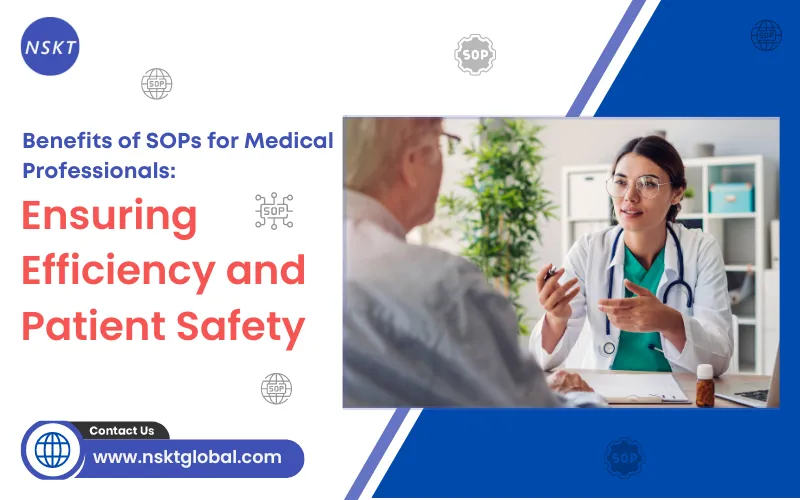Table of Contents
In the rapidly evolving field of medicine, standard operating procedures (SOPs) play a crucial role in maintaining high-quality healthcare delivery. SOPs are documented guidelines that outline step-by-step instructions for medical professionals to follow in various clinical scenarios. These procedures provide a structured approach, ensuring consistency, efficiency, and patient safety. In this blog, we will explore the significant benefits of SOPs for medical professionals and how they contribute to the overall success of healthcare organizations.
-
Enhanced Patient Safety
Patient safety is paramount in any healthcare setting. SOPs provide a standardized framework for medical professionals to follow, minimizing the risk of errors and adverse events. By adhering to SOPs, healthcare providers can ensure that best practices and evidence-based guidelines are consistently applied, reducing variability in care. This consistency promotes patient safety by minimizing the potential for mistakes, improving accuracy in diagnosis, and reducing the likelihood of medical errors.
-
Increased Efficiency and Time Management
Efficiency is crucial in the fast-paced environment of healthcare. SOPs outline streamlined workflows and standardized processes, enabling medical professionals to work more efficiently. By following a set of established procedures, professionals can save valuable time by avoiding unnecessary steps or confusion. SOPs also help with effective resource allocation, ensuring that medical supplies, equipment, and personnel are utilized optimally.
-
Improved Team Collaboration and Communication
Medical professionals often work in interdisciplinary teams, where effective collaboration and communication are vital. SOPs facilitate a common understanding of procedures and protocols among team members, promoting seamless teamwork. Clear and concise SOPs eliminate ambiguity and misunderstandings, ensuring that all team members are on the same page. This standardized approach enhances communication, fosters mutual trust, and reduces the potential for errors arising from miscommunication.
-
Consistency in Training and Orientation
Medical institutions frequently have new staff members joining their teams. SOPs serve as valuable training and orientation tools, providing newcomers with comprehensive guidelines for various clinical scenarios. New professionals can quickly grasp the standard procedures and expectations, accelerating their integration into the healthcare system. SOPs also assist in ensuring that all team members, regardless of their experience level, adhere to the same protocols, thereby maintaining consistency in patient care.
-
Quality Assurance and Compliance
SOPs are indispensable for quality assurance and compliance in healthcare. They serve as reference points for audits, inspections, and accreditation processes. By following well-documented SOPs, medical professionals demonstrate their commitment to maintaining high standards of care. SOPs also help healthcare organizations stay compliant with legal and regulatory requirements, ensuring that all procedures are performed ethically and within the boundaries of the law.
-
Continuous Improvement and Evidence-Based Practice
SOPs provide a foundation for continuous improvement in healthcare. As medical knowledge advances and new evidence emerges, SOPs can be updated and refined to reflect the latest best practices. By incorporating evidence-based guidelines into SOPs, medical professionals can ensure that their practices align with the most current and effective treatments available. This commitment to evidence-based practice fosters a culture of continuous learning and improvement within healthcare organizations.
-
Emergency Preparedness
In critical situations, such as medical emergencies, having well-defined SOPs is crucial. Medical professionals must be prepared to act swiftly and decisively to save lives. SOPs for emergency scenarios outline specific protocols and steps to be followed, ensuring that healthcare providers can respond effectively in high-stress situations. By practicing and rehearsing emergency SOPs, medical professionals can maintain their readiness and optimize patient outcomes in urgent situations.
Conclusion
Standard operating procedures (SOPs) are invaluable tools for medical professionals in ensuring efficient and high-quality patient care. By promoting patient safety, increasing efficiency, enhancing team collaboration, ensuring compliance, and enabling continuous improvement, SOPs play a vital role in the success of healthcare organizations. In this regard, NSKT Global is a leading provider of comprehensive SOP solutions for medical professionals. Our expertise in developing and implementing SOPs tailored to the specific needs of healthcare organizations is unparalleled.
Experience the numerous benefits that SOPs offer, ranging from enhanced patient safety to improved efficiency and compliance. Trust in the expertise and support provided by us to implement SOPs that align with your organization's unique requirements and goals. Together, let us revolutionize the way healthcare is delivered and ensure the highest standards of quality and safety for all patients.







